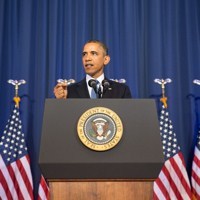In last week's column I raised the question of whether the United States can succeed in achieving its strategic objectives with regard to stability in Afghanistan and curtailing Iran's nuclear ambitions through negotiations with the Taliban and the new government of Iranian President Hasan Rouhani. But if the reaction of U.S. pundits to the Obama administration’s efforts to get accused NSA leaker Edward Snowden extradited are any indication, then the sort of protracted diplomatic efforts needed to resolve the Iran and Afghanistan crises are likely to run into considerable domestic political resistance.
American commentators on the left and the right are united in the perception that a refusal on the part of other countries to immediately comply with a U.S. request—in this case, to extradite Snowden—is an ipso facto admission of American defeat and a sign that negotiations don't work. Conservative pundits argue that the Obama team is ineffective because other countries do not fear or respect the United States—they see the president as weak and are confident they will pay no cost for defying Washington. Liberals are divided; for some in the Democratic foreign policy establishment, it is troubling that other countries do not seem to realize the difference between the "unilateralist” Republicans of the George W. Bush era and the Democrats whom they should now be more willing to accommodate. Others argue that Obama has been too willing to continue the policies of his predecessor—the “Barack W. Obama” phenomenon—and that only a clean break with Republican programs will allow other states to accept U.S. requests.
What all these approaches fail to recognize, however, is that successful U.S. diplomacy should not be measured solely by the extent to which an American diktat is accepted. The nature of any diplomatic effort is that the other party is free to say "no," whether it is threatened or asked nicely to toe the American line. The problem is that, when faced with a refusal, many come to the erroneous conclusion that the very act of engaging in diplomacy was a waste of time.

